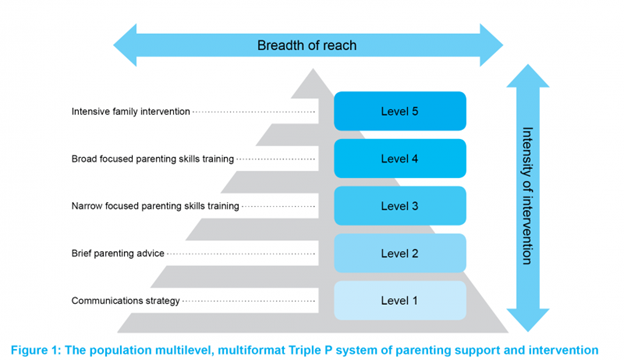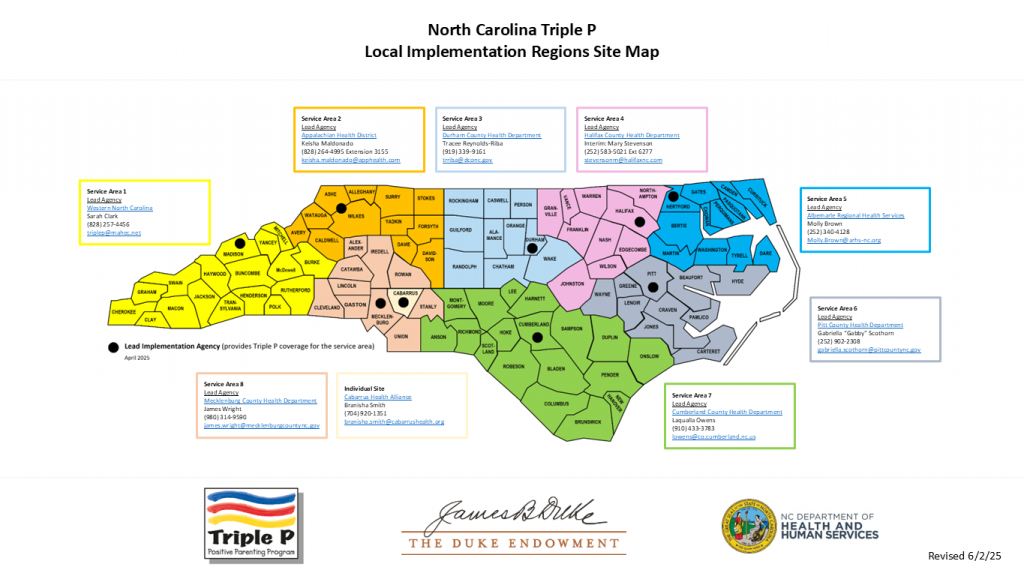Strengthening Families Through Collaboration: NC Triple P & Local DSS Agencies
North Carolina’s families thrive when family-serving community partners work together, and strong collaboration is at the heart of that success. Local Departments of Social Services (DSS) can play a powerful role in preventing crises and promoting long-term well-being by partnering with Lead Implementing Agencies (LIAs) to bring the Positive Parenting Program into everyday practice. By aligning Triple P’s proven strategies with your existing day-to-day work, DSS teams can provide parents and caregivers with the tools they need to thrive and make a lasting difference in their communities.
Why Local DSS Agencies Should Partner with Lead Implementing Agencies
Local DSS agencies are uniquely positioned to reach families at critical moments such as CPS involvement, reunification efforts, or economic hardship. By integrating Triple P into DSS systems, counties can:
- Prevent deeper system involvement through early intervention
- Improve parenting outcomes during foster care or reunification
- Support Work First families and kinship caregivers
- Offer caseworkers practical tools for supporting families
- Demonstrate progress toward Families First Prevention Services Act (FFPSA) and prevention-focused goals
Triple P has provided my clients with insights into parenting and co-parenting; insights they either thought they already understood or hadn’t considered, as many were parenting the way they were raised, simply because “it worked.” But did it really work? And more importantly, is it working for your little individuals? The most dedicated clients have developed meaningful skills by applying what they learned from the interventions and techniques offered through Triple P. Some started the process unsure of how it would help, or even if it could, but they were still willing to give it a try. Co-parenting partners created a united front, dividing responsibilities based on their individual strengths. They were committed to the program, making adjustments as needed, and continued using the strategies without giving up, until they began to see positive changes in their children’s behavior. Triple P is tried, tested, and truly effective.
What is Triple P?
Triple P is an evidence-based, multi-level system of parenting support interventions designed to reduce child maltreatment, strengthen family functioning, and build caregiver confidence. The program is flexible and has proven to work in real-world settings, including DSS, schools, healthcare, and community organizations.
Collaborating with your LIA will help to determine which levels of Triple P work best for the parents and caregivers in your community and equip DSS agencies with the training and support to meet those needs.
Triple P’s five levels of support meet families where they are:

Level 1: Public Awareness
Media campaigns and outreach presence to reach a broad cross section of a community to normalize parenting support and reduce stigma.
Level 2: Brief Advice
Single-session seminars or short consultations for everyday concerns like bedtime, routines, or behavior. It is available for parents of children from birth to 12 years and for parents of teenagers.
Level 3: Targeted Support
Targeted counseling for parents of a child with mild to moderate behavioral difficulties. It is available for parents of children from birth to 12 years and for parents of teenagers. Level 3 interventions deal with a specific problem behavior or issue. (tantrums, whining, etc.).
*Primary Care can be delivered in approximately four brief sessions, while Discussion Groups typically involve one session.
Level 4: Comprehensive Skills-Building
Group or individual parenting sessions for multiple, persistent concerns. It is available for parents of children from birth to 12 years and 12–16 years and covers Triple P’s 17 core positive parenting skills that can be adapted to a wide range of parenting situations.
*Level 4 interventions often involve up to ten weekly sessions, depending on the format (e.g., group, individual, or online).
Level 5: Intensive Intervention
Additional support for families experiencing complex challenges (e.g., stress, trauma, or partner conflict). Parents generally complete a Level 4 Standard or Group program before (or in conjunction with) a Level 5 course, however parents can also be referred.
*Level 5 sessions can also be combined with Level 3 interventions, depending on the family’s needs.
Triple P Online (TPOL)
A self-guided, interactive version of Level 4 that is free for all NC parents. DSS staff are encouraged to use available hybrid support options. DSS staff can also gain access to the TPOL case management system to support and track families’ progress.
Why Triple P Makes Your Job Easier
Triple P equips DSS staff with practical, evidence-based tools that reduce stress and improve outcomes for the families you serve. Whether you’re supporting reunification, kinship placements, or Work First families, Triple P gives you strategies you can use right away. With flexible formats, including online options and brief sessions, it fits into your workflow and helps families build skills without adding to your caseload. Plus, you’re not alone, your regional Triple P support team is here to coach, train, and back you every step of the way.
DSS roles such as intake workers, in-home case workers, or foster care recruiters are well-positioned to deliver specific levels and variants of Triple P (e.g., intake specialist – Brief Primary Care or foster care recruiter – seminars or discussion groups). Existing parenting support partners may also be ideal practitioners of Triple P.
Often, I find that parents/caregivers come to the sessions feeling as if they do not need support with their children. While I am in the middle of the sessions with them, I can see a light bulb going off above their heads. They finally see why TRIPLE P is important for the future of the family structure. They see that they are doing a lot of things right and they just need a few steps to what is already working for them. One of the most important steps is ROUTINES. When they finally implement the strategies, they see things improve at home and in the family structure. They finally can see that the family structure will start to come together as a unit and things flow a lot smoothly for all involved. Triple P is a very simple program to use with major benefits when it is used correctly and consistently.
Regional Lead Implementing Agencies: Your Triple P Support Team
Effectively implementing Triple P requires more than training; it requires infrastructure and guidance. That’s where Regional Lead Implementing Agencies (LIAs) come in. These agencies provide:
- Readiness and fit & feasibility assessments for your agency to determine which levels of Triple P best meet the needs of your clients
- Training and accreditation of child DSS staff and community providers
- Ongoing coaching (including peer support, data support, and fidelity support) to ensure Triple P is delivered effectively
- Data collection and outcome monitoring to show impact and guide improvement
- Cross-sector coordination across health, education, and human services
By partnering with your local LIA, your DSS team gains a knowledgeable partner invested in your success as well as brokering relationships with other parenting support programs, such as Improving Community Outcomes for Maternal and Child Health (ICO4MCH) (Currently in Guilford County, Mecklenburg County, Sandhills Collaborative, and Wake County).
Ready to Explore Partnership? Contact Your Regional Triple P Support Team!
If your DSS team is ready to explore how Triple P can support your prevention, reunification, or family services goals, reach out to your regional LIA or contact:

Dig Deeper
For more information about Triple P, visit the Triple P website

